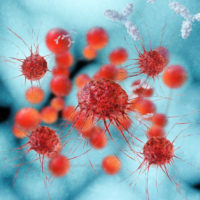Interactions with fibroblasts are distinct in basal-like and luminal breast cancers
Basal-like breast cancer cells induce phenotypic and genomic changes in macrophages
Age-associated gene expression in normal breast tissue mirrors qualitative age-at-incidence patterns for breast cancer
Stable isotope resolved metabolomic differences between hormone-responsive and triple-negative breast cancer cell lines.

Studies Explore Mechanisms Behind Obesity-Cancer Link
May 20, 2019 – Research findings presented at the American Association for Cancer Research Annual Meeting 2019 explore possible reasons for obesity-related resistance to breast cancer treatment and possible strategies to overcome obesity-related immune suppression in cancer.

Starving Cells May Lead to New Cancer Treatments
November 20, 2018 – Nutrient availability regulates cell metabolism, growth, and survival. When nutrients are in short supply, cells can pause their growth or even eliminate themselves through a process known as programmed cell death, thereby protecting the health of the organism as a whole. If nutrient deprivation happens at certain critical periods, such as during the rapid growth of the embryonic brain, severe developmental consequences can arise (this is why proper maternal nutrition is so important). In contrast, harnessing the innate ability of cells to enter programmed cell death is an important strategy in cancer treatment.

Breaking the Link Between Obesity, Gastrointestinal Cancers
October 3, 2018 – UNC NRI’s and UNC Lineberger’s Stephen Hursting, PhD, MPH, along with Cornelia Ulrich, PhD, MS, the director of the Huntsman Cancer Institute’s National Cancer Institute-designated Comprehensive Cancer Center, and colleagues, reviewed findings from research looking at the biological links between obesity and cancers of the colon, rectum, pancreas, liver, esophagus, gallbladder and stomach, as well as published studies on how diet, exercise, weight loss surgery, and other weight-related interventions may help reverse this connection.
